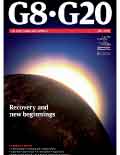

 |
 |
|

The euro and the Greek crisis:
a new international monetary scenario
By Paolo Savona, Guglielmo Marconi University, Rome
To download a low-resolution pdf, click here or go to the Newsdesk site.
The global market requires an international currency that is managed beyond national interests and a disciplined common exchange-rate regime. The EU and the euro need urgent reform if the euro is to be a monetary heavyweight
The 2007-09 crisis has taken one more victim: the euro. The collapse of confidence in Greece has the reduced credibility of the European Union. This is an expression of the weakness of the European institutional architecture. Surprisingly, the fall in the euro’s
value followed a period characterised by the belief that the euro would replace the dollar as the international reserve currency. Although some economists – and, indeed, some vested interests – insist this was largely inconsistent with prevailing political conditions, the conventional belief did not waver.
The euro area – with only 16 out of the 27 EU members – is not an optimal currency area from many points of view. It needs compensatory fiscal unification to share the risk for a common future. The rejection of the Lisbon Treaty sent a clear message of the EU’s unwillingness to apply the same rules for every citizen in Europe.
Nonetheless, after having acquired sovereignty on competition policy and money management, the EU reinforced the role of the European Parliament. Yet it has been unable to coordinate fiscal policies, which remain in the hands of member states. Complicated decision-making procedures and ill will toward political unification limit the permanent success of the euro area and the possibility of the EU using all its potential geopolitical influence.
The Greek crisis has revealed deep political differences among EU members. These differences date back to the signing of the Maastricht Treaty. They grew after a long period of relatively low growth and the impact of the recent financial crisis on employment. The founding ‘idea of Europe’ lost its appeal after the great events at the end of the 20th century: the fall of the Berlin Wall and the rise of China and other emerging countries. The most influential EU members and the EU Commission itself revealed their inability to adapt treaties to the new geopolitical and geoeconomic changes.
Since the start of the 21st century the value of the euro has increased under the pressure of the conversion of the dollar made by countries with a fixed or pegged exchange rate regime, such as China and oil producers, that participate in global trade. This was the result of the United States abandoning the Bretton Woods agreement in 1971 without enforcing a common exchange-rate regime among the members of what is now the World Trade Organization (WTO). The EU did not understand that the euro needed a different external exchange rate regime – fixed or pegged, instead of floating – to protect itself from the conversion of the dollar-denominated official reserves of other countries into euros. This pushed up the euro’s value, discouraging European exports, lowering the euro area’s rate of growth and weakening the appeal of political unification among European citizens. The rejection of the Lisbon Treaty has been interpreted as a result of the poor economic performance of EU institutions.
The European Central Bank (ECB), however, was satisfied by the euro’s strength, seen as evidence of the ECB’s success in anti-inflationary management. The appreciation of any currency helps keep the rate of inflation down but raises the question of whether deflation can produce monetary success.
The ECB’s monetary policy became paradoxical when the ECB (together with the European Commission) pressured China to revaluate the yuan-renminbi as requested by the United States. China firmly resisted, and the euro was saved from greater appreciation.
From this perspective, the drop in the euro’s value as a result of the Greek crisis has helped the recovery of European exports. This new situation would allow a change in the Chinese exchange rate regime or an extension of the range of pegging the yuan without affecting the euro. And yet this contingent condition does not change the fundamental need for a true political organisation within the EU as a prerequisite for a strong euro. It is thus difficult to understand Germany’s approach of creating a reserve currency by a country or an area with a balance-of-payments deficit. Having a strong currency is inconsistent with keeping a huge surplus in the balance of payments, as Germany does.
One concern with regard to the Greece bail-out is whether the EU should accept any intervention by the International Monetary Fund. The idea that the euro might seem a better reserve currency than the dollar is the result of a misinterpretation of the real needs of a well-functioning global market. A global market requires an international currency managed beyond national interests, as is the case with both the dollar and the euro. Free, asymmetric competition among national currencies produces gains derived from managing differing exchange rates. The different exchange rate regimes tear apart the common rules of fair competition and lead to structural disequilibria in trade balances. Yet this issue is not on the global agenda, nor was it during the 2007-09 crisis and its Greek appendix. The appreciation of the dollar diverted the attention of policymakers from its instability and the poorly functioning international monetary system, both part of a more general problem concerning the international financial architecture still on the global agenda.
The possibility of speculation grew after the large diffusion of derivative contracts. Speculation no longer needs money since it has many new instruments in addition to the traditional, controlled monetary and financial instruments. The G20 promised a global legal standard to fight speculation, but the world is still waiting for it. To be effective, the new monetary and financial architecture should regulate all sectors in the same manner to avoid facilitating moves toward less regulated sectors (such as credit default swaps and hedge funds) instead of regulated ones (such as bonds and shares).
With regard to the EU, any attempt to regulate the euro without a parallel programme to regulate the dollar and differences in exchange rate regimes is destined to fail. European governments and regulators maintain that the euro is safe but that fiscal and wage discipline is required. As for the dollar, its regulators claim they can do nothing to control its supply or to force China – or any other country with a surplus – to change its currency regime. Perhaps they speak the truth. But it is not enough to avoid proposing a solution for improving the performance of world trade, and thus sustaining and enlarging growth.
Zhou Xiaochuan, governor of the People’s Bank of China, has proposed expanding the creation of special drawing rights (SDRs) to allow a smooth substitution of the dollar as the international reserve currency. Such an agreement should be implemented by China shifting to a floating system in exchange for the guarantee of the value of its dollar-denominated official reserves. The United States cannot keep the dollar at the centre of the international trade system and continue to borrow from the rest of the world in order to keep a high domestic rate of growth. Eventually the dollar will collapse, as in August 1971. Its recent recovery is the result of a psychological reaction to the crisis – the view that the dollar was ‘the worst currency except all the others’. But for how long? The market constantly produces monsters that kill the market itself to regenerate its rational role. If it does not perform this ‘purification’ process, things end up in the hands of the judiciary’s power, as is happening now.
If the EU and the euro area cannot reform their institutional and constitutional architecture, they would benefit from implementing an international agreement on a new international currency, such as SDRs, together with a change in WTO rules: those countries that participate equally in the free global market must have the same exchange rate regime.
If so, the euro would grow stronger instead of being exposed, as it is now, to the perils of a stormy sea, just like a boat caught between the weakness of the dollar and the official reserves of countries with trade surpluses heavily reinforced by speculation.
|
This Information System is provided by the University of Toronto Library |
All contents copyright © 2024. University of Toronto unless otherwise stated. All rights reserved.